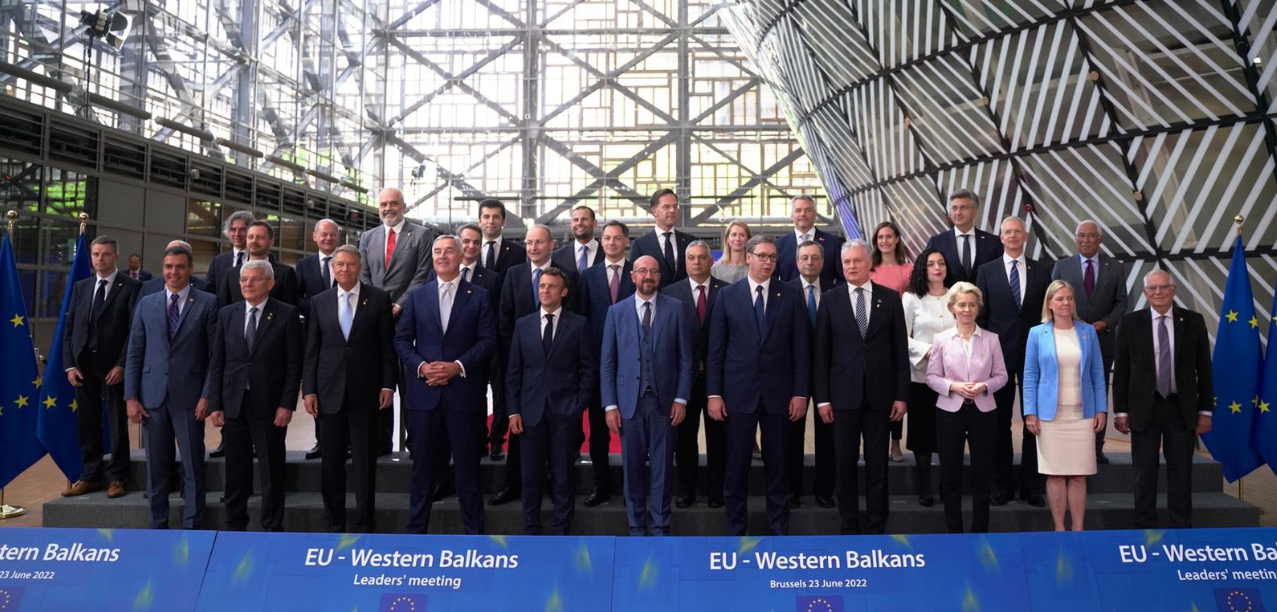TIRANA, June 23, 2022 – Anger and frustration was palatable among the representatives of Western Balkan states following a summit with EU leaders in Brussels on Thursday as it became clear Albania and North Macedonia would not be able to open negotiations with the bloc and Kosovo would once again be denied visa-free access.
The negative results did not come as a surprise, as some of the leaders, including Albanian Prime Minister Edi Rama, discussed boycotting the summit in protest of what has become a lengthy and unproductive process.
Bulgaria did not agree to lift its veto on opening negotiations with North Macedonia, over bilateral concerns, and Albania has been coupled with North Macedonia by the EU, so it too cannot progress.
“It’s a disgrace that a NATO country, Bulgaria, kidnaps two other NATO countries, namely Albania and North Macedonia, in the midst of a hot war in Europe’s backyard with 26 other EU countries sitting still in a scary show of impotence,” Rama said at a press conference related to the summit.
The European Union is granting candidate status to Ukraine and Moldova this week, a move that the Western Balkan states support, but with critics pointing out that it is unfair to leapfrog the two states ahead of Bosnia and Herzegovina and Kosovo. They also point out that the candidate status simply means they could be waiting for decades for membership, as people in Albania and North Macedonia already know.
Having no progress with the Western Balkans “is not the way to show Ukraine and Moldova that they have an EU future,” Florian Bieber, a leading expert on the Western Balkan region wrote on Twitter.
North Macedonia has been waiting to open negotiations as an EU candidate since 2005, Albania since 2014. While Albania’s delays have been a mix of domestic political issues combined with a confused EU over future enlargement, North Macedonia was delayed by a disagreement with Greece over its name. Once it solved it, Bulgaria came up with its own objections, invoking its veto power on negotiations with would-be members in 2020 to block North Macedonia’s candidacy based on accusations that the Macedonian language was simply Bulgarian by another name and Skopje was disrespecting its shared cultural and historic ties to Bulgarians.
“What has happened is a serious blow to the EU’s credibility,” said Dimitar Kovacevski, North Macedonia’s prime minister.
All six Western Balkan countries — Albania, Bosnia and Herzegovina, Kosovo, Montenegro, North Macedonia and Serbia — want to join the EU and have been promised a future within it, but progress toward membership has virtually stopped in recent years, leading to growing frustration and anger.
Some critics also point out that the fact that the EU’s divisions have stopped integration is also legitimizing the failures of local governments to progress with modernizing their states and strengthening democracy, including growing authoritarianism in Serbia and democratic backsliding in Albania.
“Bulgaria’s veto also legitimizes the likes of Vucic and Rama,” Dimitar Bechev, an expert on the region wrote on Twitter, paraphrasing their view as: “We don’t need the EU and will stick to our ways. It’s on Europe.”
Kosovo is facing an uphill battle even having its 2 million citizens travel visa-free to most of the EU, a right that has long been extended to all other states of the region as well as Ukraine and Georgia.
“There is an urgent necessity to … reenergize Kosovo’s EU integration, starting with visa liberalization,” Kosovo President Vjosa Osmani said in Brussels. “We have undertaken all necessary steps to bring our people closer to the European Union, in the spirit of our shared values.”
Despite the lack of progress on Thursday, EU officials pointed out the countries have clearly been told the promise for an EU future, made two decades ago, still stands.
German Chancellor Olaf Scholz urged his fellow EU leaders to re-invigorate the integration of the Western Balkans.
“Western Balkans will have a good opportunity to really become members of the European Union,” Scholz said ahead of the summit meeting on Thursday. “They’ve worked so hard, so it’s our common task that this is something that will happen.”
Germany and other countries say they tried hard to convince Bulgaria to lift the veto to no avail. The Bulgarian government fell this week and the country is heading to new elections.










